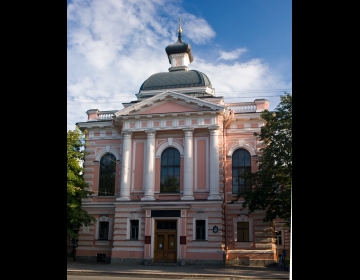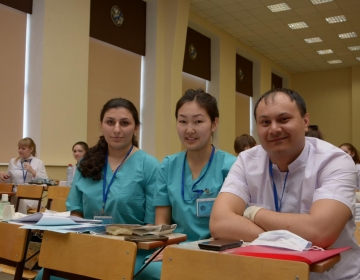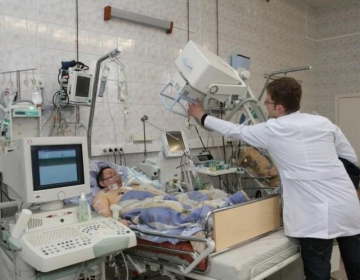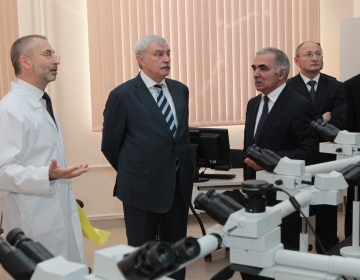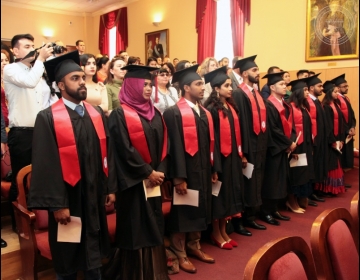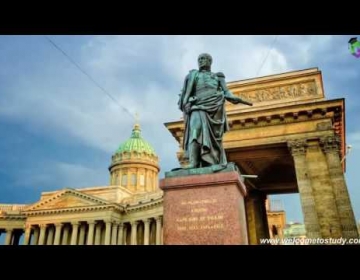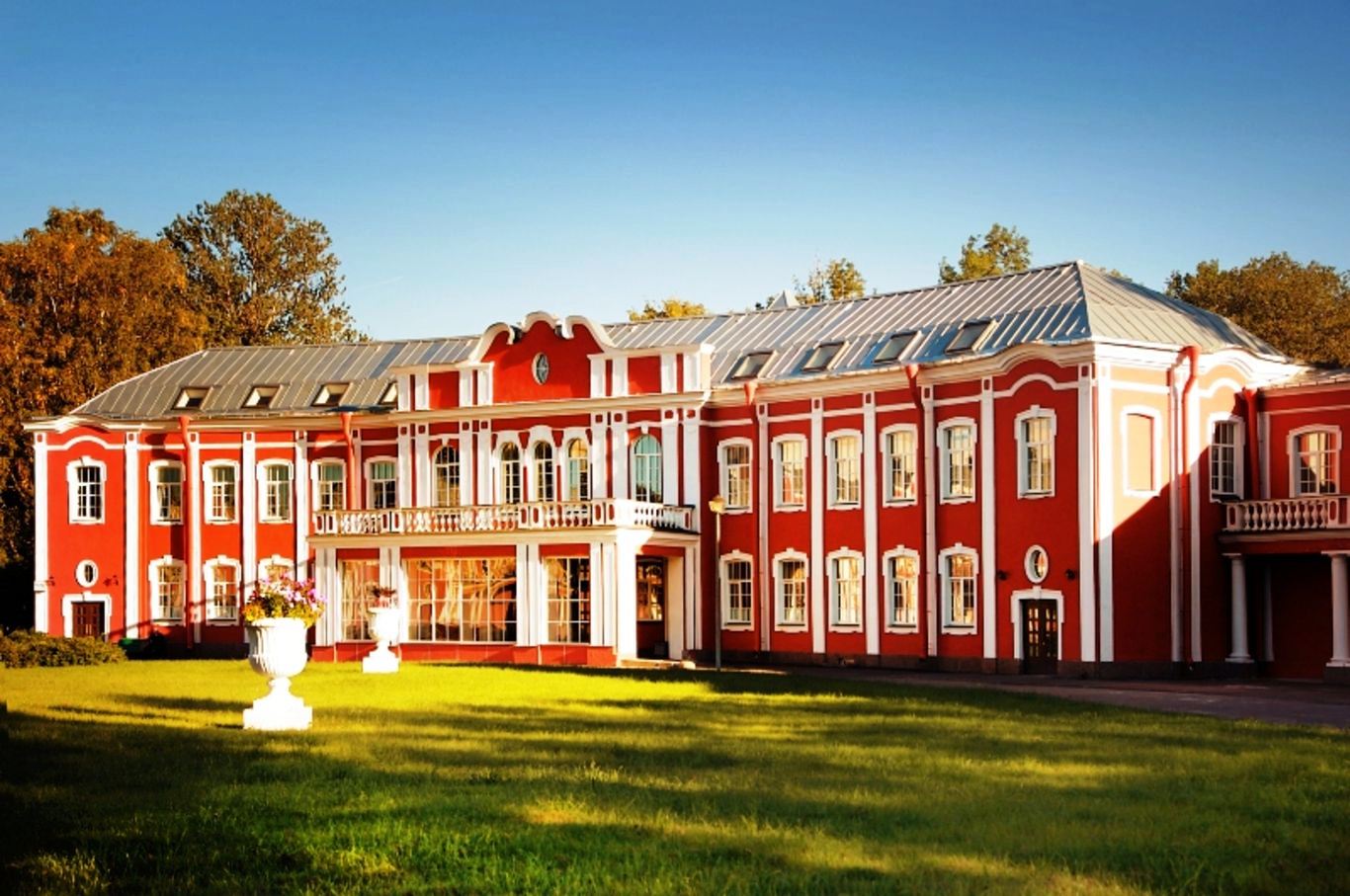
- Over 7000 students
- University divisions: 77 buildings ,44,5 ha territory
- NWSMU named after I.I. Mechnikov ranks the 5th position among TOP 100 Russian Universities
- 3 main directions: medical education, clinical work and scientific research
- 112 departments and 8 faculties
- One of the largest centers of genetic engineering bio-therapy
- The largest Russian bank of umbilical cord blood samples
- Clinical work is provided by using 1645 beds in 14 medical profiles
- Annually the University provides high-quality medical assistance for about 40 000 patients at the hospital and to 40 000 in the outpatient setting
- 2 research institutions and 6 research laboratories and departments
- A big museum complex (Museum of forensic medicine with thanatology center, Museum of Anatomy, Museum of dentistry, SZGMU history museum)
North-Western State Medical University (NWSMU) in Saint-Petersburg (Russia) named after I.I. Mechnikov was founded in October 2011 as a result of a merger of two Russian institutions having unique history – Saint-Petersburg Medical Academy of Postgraduate Studies and Saint-Petersburg Medical Academy n.a. I.I. Mechnikov. The history of Saint-Petersburg Medical Academy of Postgraduate Studies began in 1896. The Academy was founded by famous Russian professors of medicine N. Pirogov,.E. Eichvald, N. Zdekauer. In its turn Saint-Petersburg Medical Academy takes its origins in Psychoneurological Institute founded by famous academician V.M. Bechterev in 1907.
NWSMU is named after outstanding Russian scientist in Medicine, Nobel Prize winner in Physiology and Medicine Ilya I Mechnikov.
Today the University carries out its activity in 3 main directions: medical education, clinical work and scientific research. At present about 7000 students, including foreign students are studying at the University. Up to 35 000 specialists undergo their short and long-term postgradual training annually.
The clinical work at North-Western State Medical University (NWSMU) named after I.I. Mechnikov is provided by using 1645 beds in 14 medical profiles in its own clinical centers. Every year the clinical departments of the University provide high-quality medical assistance for about 40 000 patients at the hospital and for 40 000 in the outpatient setting.
Research work at the University is carried out in accordance with the priority directions of biomedical sciences development and modern trends in higher medical education and is aimed to introduce the results of the scientific research into everyday practice. Scientific researches at the University are conducted by 2 research institutes, 6 research laboratories and departments.
The University is internationally active, students exchange and postgraduate exchange programs, professional practical training, foreign specialists admission are always available. Students from many countries of the world do their trainings at the University (they are form Finland, Germany, China, Japan, Portugal, Spain, Kazakhstan, France, Italy, Czech Republic, Great Britain, Poland, USA, Slovenia, Israel, Turkey, Belgium, Sweden, Serbia, Austria, Denmark, UAE, Netherlands, Norway and other country).
Students’ life at the University is rich and bright; it is focused on the development of social activity, leadership and communication properties due to the participation in the work of Student Council, Trade Union, Student Scientific Activities, Sports clubs and Press club.
Sport is an integral part of everyday students; life. Basketball, volleyball, futsal, arm-wrestling, chess, body-building and aerobic classes function at the University.
Every year NWSMU organizes concerts, competitions and other events for students.
NWSMU named after I.I. Mechnikov ranks the 5th position among “TOP 100 Russian Universities”.
According to the RAEX (international rating agency) NWSMU takes leading positions of Higher Institutions in the Commonwealth of Independent States.
The successful development of the educational, scientific, medical management of the University’s activity in many respects is connected with the formation and use of advanced information technologies which ensure free and fast access to the necessary information for making promising and valid solutions.
Educational activity.
The University prepares high-quality specialists at 112 departments, which are consolidated in 8 faculties:
Faculty of General Medicine
Medical-Prophylactic Faculty
Surgical Faculty
Therapeutic Faculty
Pediatric Faculty
Medical-Biological Faculty
Faculty of Education for Nurses, Health Care and Social Work
Dentistry Faculty
Training process is focused on a merger of traditional and innovative educational approaches and technologies. The quality of education is constantly being monitored by an independent Test Center.
Education is realized in Russian language, but for foreign students, who do not know Russian language the foundation course is available. The duration of the Foundation course is 1 academic year.
The University Structure.
Today North-Western State Medical University n.a. I.I. Mechnikov counts 77 buildings and 44,5 ha territory.
8 faculties, 112 departments function at the University as well as its own hospitals, medical centers and clinical departments with modern medical equipment.
There are 2 libraries with more than 125 history: educational and scientific ones, both having rich library stocks.
For foreign students there are bock-made students’ hostels, including 32 blocks (every block has 8-9 rooms), 24 rooms for 2, 3 or 4 people living.
The University has its own publishing activities and issues its own newspaper and 6 magazines.
The Council of young scientists and specialists and the Council of student scientific society work actively at the University. Scientific researches are conducted by 2 research institutions and 6 research laboratories and departments:
The Central Research Laboratory
The Research Laboratory of Innovative Methods of Functional Diagnostics
The Research Laboratory of Cellular Technologies
The Research Laboratory of High Laser and Magnetic Technologies
The Research Laboratory of Innovative Technologies of Medical Navigation
The Research Laboratory of the Holter Monitiring.
Research Institute of Mycology n.a.P.N. Kashkin is the greatest mycological center of the Ministry of Health Development of the Russian Federation and has the status of the first reference institution of medical mycology in Russia. Mycological monitoring laboratory and biology of fungi, molecular genetics microbiology, immunology and allergology, morphology and cytology, Russian largest collection of pathogenic fungi function within the framework of the Research Institute.
Research Institute of Endocrinology carries out fundamental and applied research in contemporary endocrinology and develops methods of treatment of various forms of endocrine pathology. Research Institute consists of Scientific-Research Department of Clinical Endocrinology, laboratory of experimental endocrinology and chromatography
One of the largest centers of genetic engineering bio-therapy in the country operates successfully at the University, where patients with severe systematic autoimmune diseases may receive modern innovative assistance.
The largest bank of cord blood samples belongs to the University structure as well.
University’s clinics are equipped with the modern facilities and provide all spectrum of hi-tech medical assistance. In the surgical clinics a wide spectrum of unique hart and vessels surgery are made routinely.
Various modern diagnostic approaches such as digital magnetic resonance and computer tomography with high-resolution, angiography and x-ray installations, the system of mapping of the heart rhythm, ultrasonic units of exert class, digital automatic laboratory analyzers are in wide use at the University. Two haemodialysis centers are operated at the institution.
The University owns a rich Museum Complex, having NWSMU n.a.I.I. Mechnikov History Museum, the Museum of forensic medicine with thanatology center, Museum if Anatomy, Museum of dentistry and others.
| Educational programs | Course duration |
|
General Medicine (MD diploma) |
6 years |
| Dentistry | 5 years |
| Preventive Medicine (diploma of the Doctor for preventive medicine) | 6 years |
| Diploma in Nursing | 5 years |
| Master Programme in Public Health | |
|
Postgraduate training |

